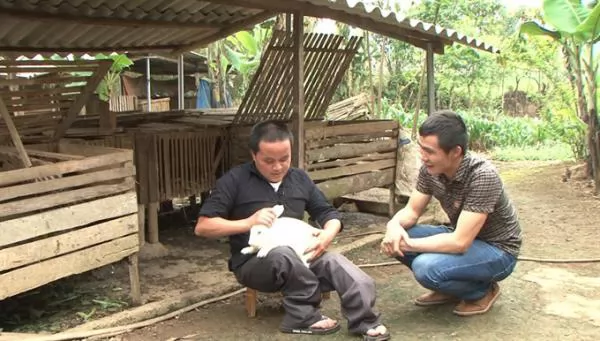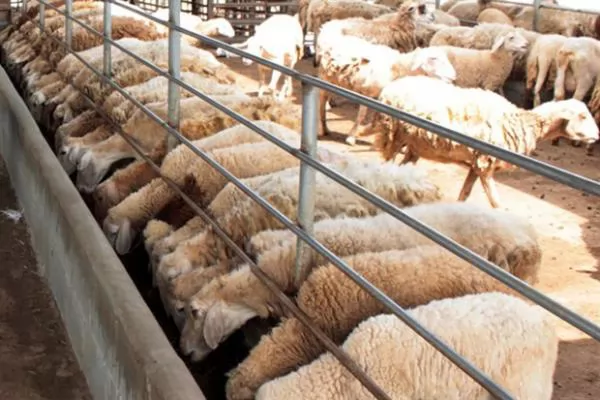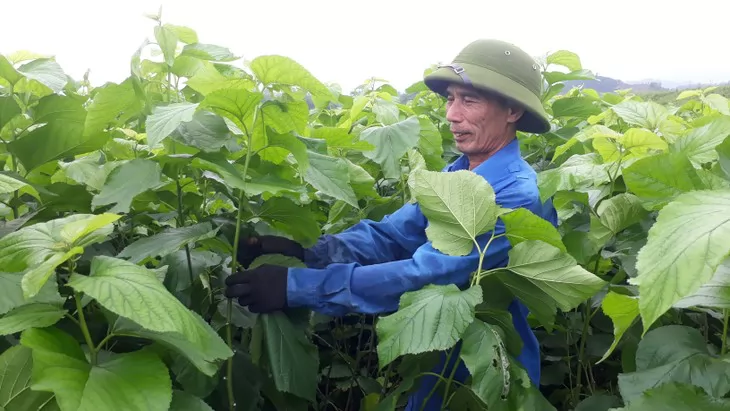Brittle-boned man reaps success with self-taught rabbit trade

Vương Quốc Trường of Quản Bạ District in Hà Giang Province, born with brittle bone disease, managed to start his own rabbit farm. — Photo hagiangtv.vn
Viet Nam News / Nguyễn Trần Bé
HÀ GIANG — A Nùng ethnic man born with brittle bones has defied physical limitations to develop his own business in the northern mountainous province of Hà Giang.
Though his own legs no longer work, Vương Quốc Trường, born in 1986, has a passion for nimble-legged rabbits.
His work as a ground-breaking rabbit farmer has been paid off; Trường was amongst the five young candidates selected to represent the province at the fifth “Vietnamese youth study and follow Uncle Hồ’s teachings” ceremony held in HCM City earlier this year.
Overcoming fate
Trường is the youngest child in his family, with four healthy older siblings.
The first year in the primary school, he broke both of his legs after a slight fall that wouldn’t result in such dramatic injuries to a normal child, his father, Vàng Vản Chín, told Lao Động (Labour) newspaper.
“We were heart-stricken to find out his condition. But on the bright side, only his leg bones were afflicted with the brittle bone disease; the bones in his arms and other parts of the body are in order,” Chín said.
From the age of seven to 13, Trường broke his legs 16 times. That 16th time rendered his legs immobile and put an abrupt end to the child’s academic pursuits: Trường could no longer go to school. But he started to learn how to move around with his still healthy arms.
Looking at Trường’s upper half body, it’s hard to imagine his disability.
“His legs might not be working, but his brains and arms are still in order. When he harvests vegetables, his manoeuvre to balance the baskets and bring them home is almost a circus performance. He is always trying to defy his fate,” Mai Xuân Hùng, chairman of Quản Bạ District’s disability association, said.
“I can do most typical things one should be able to do, of course, with a bit of struggle, but I have gotten used to manoeuvring in my own ways,” Trường said.
“Luckily, I am not short of persistence and don’t want to be dependent on others, and everything has turned out fine,” he added.
Self-made business
Tired of being known as “the one with the glass bones”, a common Vietnamese nickname for those with brittle bone syndrome, in 2012, Trường started to put into motion his plan to make a name for himself.
“Not to brag, but I am the first one in Quyết Tiến Commune to raise New Zealand rabbits,” Trường proudly says of his rabbit farm to anyone who comes to visit.
The inspiration came after Trường read about the particular breed in newspapers. These rabbits have yielded a fair income for the owners, and, most important, he was able to meet the physical requirements for raising them.
“I asked an uncle on my wife’s side in Bắc Quang District to go to the rabbit farming research centre in Sơn Tây town in Hà Nội to buy 10 rabbits, and raised them on my own,” he said. As he spoke, the fluffy creatures lay quietly in the bamboo cages that are impressive for their utilitarian simplicity, as the material is inexpensive and easy to get in the rural communes throughout Hà Giang.
Like any self-taught venture, Trường’s efforts started with a string of trial-and-errors.
“At the beginning, I was really upset that my rabbits sometimes just fell ill out of nowhere, or even died,” he said.
Learning from his errors and continuing to gather materials on methods to care for the New Zealand rabbit, Trường gradually built up his expertise on how to make the rabbits healthier and produce more offspring.
At his busiest time, Trường takes care of about 500 pairs of rabbits. He says they’re easily sold as the market demand is high.
A pair of fertile rabbits could fetch around VNĐ250,000 (US$11), with buyers from as far as Vũng Tàu Province in the southern region, or other northern provinces like Hà Nội, Vĩnh Phúc and Phú Thọ. But most of Trường’s customers are still local people in the commune.
“Rabbits are really fecund animals. They can produce some six to seven litters of youngsters a year, with each litter having as many as eight young ones, sometimes even up to 15,” Trường said.
“The thing that I like most about the rabbits is that they are fast-growing, resilient, yield a high output and fetch high prices. Their food is also easy to make, as a diet from vegetables and plants right in my gardens is enough.”
At the moment, with the help of his wife, Hoàng Thị Vi, also a member of the Nùng ethnic group, Trường’s rabbit trade earns him as much as VNĐ100 million ($4,350) each year, a considerable figure in the mountainous region.
Vi’s decision to marry Trường was initially met with incredulity, even criticism, from her family and acquaintances. Because she is an able-bodied woman, people told her “there are plenty better choices” for her than someone who cannot walk.
“Love is enough of a reason. If everyone just shuns him for the disability, then who could be his life partner?” Vi said.
“Trường has a disability, but he is a wonderful man, brilliant and hard-working.” — VNS
Maybe you are interested

Ninh Thuan to breed more sheep, goats for sale
The south-central province of Ninh Thuan, the country's largest animal producer, is strengthening measures to breed more sheep, goats, pigs and other animals for commercial production.

Tran Yen, first new-style rural district in Vietnam\'s northwestern mountains
The remarkable growth of agricultural production in Tran Yen district, Yen Bai province, in recent years is a result of local authorities identifying the best-adapted plants and animals.

Kiên Giang expands breeding of bivalve mollusks
KIÊN GIANG — The cultivation of bivalve mollusks in Kiên Giang Province's coastal areas has developed rapidly in the last decade, improving farmers' incomes.





